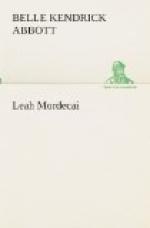“October 28.-Home again from Havana-home with bounding heart and glowing hopes. I admire that fine City of the Antilles almost as much as I do my beloved, native Queen City. I shall enjoy my new home, I know. How could I do else than enjoy it? With a satisfactory salary in our branch house, and a lovely young wife, a heathen might well be happy. Now, old Mordecai can keep his gold, if he likes, and ny father can do the same. The opposition has driven me to rely more implicitly upon myself, thank the fates. I shall be able to ’paddle my own canoe.’ Leah looks something like those Spanish beauties, only she’s a trifle sadder in expression. I trust she’ll be happy in her new home, amid Cuban bloom and under azure skies. Heaven grant her an unclouded life. I am delirious with joy; and for fear of committing too much to your keeping, Journal, I’ll stop writing. Adieu.”
CHAPTER XXII.
“Aunt Barbara,” said Leah, the day before the proposed departure of the vessel that was to bear her away, “will you tell Mingo to leave the key of the lodge hanging just inside the inner door to-night. I may be coming in, or going out late, and he need not be disturbed, if he will do that.” These words were addressed to a middle-aged colored woman, who, with high-turbaned head, moved busily about Leah’s apartment, folding garments and packing trunks, and sighing, ever and anon, as though enduring heart-felt grief at the prospect of the approaching parting.
“Yes, dear chile, I’ll tell him, if you wish. Dere is not many more times for your dear feet to pass in and out of de lodge;” and accompanying these simple, pathetic words was an outburst of honest tears, that fell upon the tidy white apron which the kind soul held to her eyes.
“Will you miss me, Aunt Barbara, when I am gone?” said Leah, deeply moved by the old colored woman’s manifestation of sorrow.
“Law, chile, God only knows how ole Aunt Barbara will miss you. But I’ll pray de good Lord to keep you safe from harm, when you are so far away, and bring you back to us again, one day.”
“Suppose I never come back, Aunt Barbara; will you ever forget me?”
The old woman made no reply, but her ponderous frame shook convulsively, with excessive emotion. Leah then approached this faithful friend, and laying her arm around her neck, said tenderly, “Don’t cry so, Aunt Barbara, but cheer me with the hope that some day I’ll come back to you.” The sound of approaching footsteps in the hall dried Aunt Barbara’s tears, and when she opened the door in response to a gentle tap, her face was as placid as a summer lake.
“Is it you, father? Come in,” said Leah, looking up to meet her father’s eye.
“Yes, my daughter. Are you ready? Are the trunks packed? Can I do anything more for you?” replied Mr. Mordecai, almost in one breath.
“Nearly ready, father. Aunt Barbara has about finished the last one, and I am ready to leave you.”




